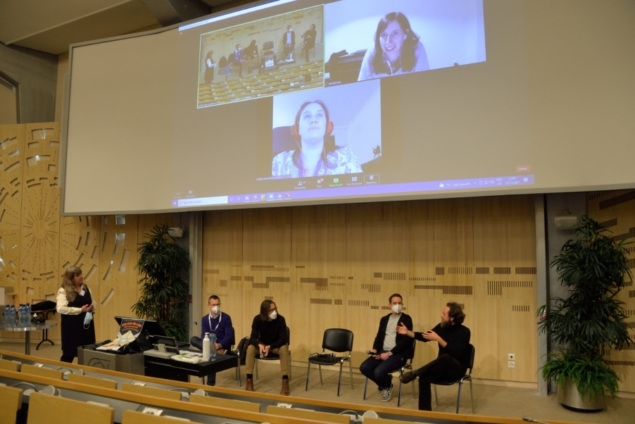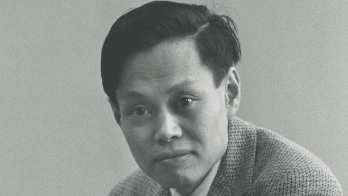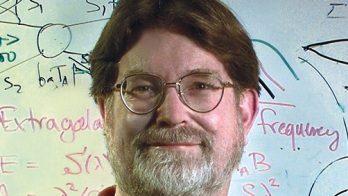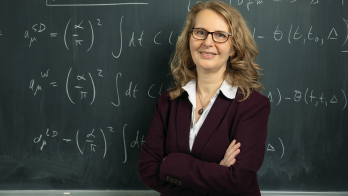The fifth LHC Career Networking event saw former LHC physicists lend their advice on securing a top job outside of the field, reports Connie Potter.

On 15 November, around 260 physicists gathered at CERN (90 in person) to participate in the 2021 LHC Career Networking event, which is aimed at physicists, engineers and others who are considering leaving academia for a career in industry, non-governmental organisations and government. It was the fifth event in a series that was initially limited to attendance only by members of LHC experiments but which, in light of its strong resonance within the community, is now open to all.
Former members of the LHC experiments were invited to share their experiences of working in fields ranging from project management at the Ellen MacArthur Foundation, to consultants like McKinsey and pharmaceutical companies such as Boehringer Ingelheim. They spoke movingly of the difficulties of leaving academia and research, the introspection they experienced to discover the path that was right for them, and the sense of satisfaction and happiness they felt in their new roles.
Adjusting to new environments
Following a supportive welcome from Joachim Mnich, CERN director of research and computing, and Marianna Mazzilli, a member of the ALICE collaboration and chair of the organising committee, the first speaker to take to the stage in the main auditorium was Florian Kruse. Florian was a physicist on the LHCb experiment who, upon leaving CERN, decided to set up his own data-science and AI company called Point 8 – a throwback from many years spent commuting to the LHCb pit at LHC Point 8. His company has grown from three to 20 staff members, some ex-CERN, and continues to expand.
Setting the tone for the evening, he talked about what to expect when interacting with industry, how people view CERN physicists and where and how adjustments have to be made to adapt to a new environment – advising participants to “recalibrate your imposter syndrome” and “adjust to other audiences”.
Julia Hunt, a former CMS experimentalist, shared a personal insight into her journey out of academia, revealing that she fortuitously came across sailor Ellen MacArthur’s TED talk and soon landed the job of project manager at the Ellen MacArthur Foundation.
The field of data science has welcomed numerous former CERN physicists, among them ex-ATLAS members Max Baak and Till Eifert, former CMS and ALICE member Torsten Dahms, ex-CMS member Iasonas Topsis-Giotis and ex-ALICE member Elena Bruna. Max gave a mini-course in bond trading at ING bank, while Iasonas put a positive spin on his long search for a job by saying that each interview or application taught him essential lessons for the next application, eventually landing him a job as a manager at professional services company Ernst & Young in Belgium. In a talk titled “19 years in physics… and then?”, Torsten shared the sleepless nights he endured when deliberating whether to continue in a field that had him relocate himself and his family five times in 15 years, ultimately turning down a tenure-track position in 2019.
Elena, who despite having a permanent position left the field in 2018 to become a data scientist at Boehringer Ingelheim, highlighted the differences between physics (where data structures are usually designed in advance and data are largely available) and data science (where the value of data is not always known a priori, and tends to be more messy), and indicated areas to highlight on a data-science CV. These include keeping it to a maximum of two pages and emphasising skills and tools, including big-data analysis, machine-learning techniques, Monte Carlo simulations and working in international teams. The topic of CVs came up repeatedly, a key message being that physicists must modify the language used in academic applications because people “outside” just don’t understand our terminology.
Two networking breaks, held in person and accompanied by beer, wine and pizza for those who were present and via Zoom breakout rooms for remote participants, were alive with questions and discussion. Former ATLAS member Till Eifert was surrounded by physicists eager to learn more about his role as a specialist consultant with McKinsey in Geneva, speaking passionately about the renewable energy, cancer diagnostics and decarbonisation projects he has worked on. Head of CERN Alumni relations Rachel Bray and her team were on hand to answer a multitude of questions about the CERN Alumni programme.
70-85% of jobs come through networking
Anthony Nardini
Emphasising the power of such events, speaker Anthony Nardini from entrepreneurial company On Deck cited a 2017 Payscale survey which found that 70–85% of jobs come through networking. Following up from the event on Twitter, he offered takeaways for all career “pivoters”: craft and prioritise your guiding principles, such as industry, job function, company stage mission; create a daily information-gathering practice so that you are reading the same newsletters, articles and Twitter feeds as those in your target roles; identify and contact “pathblazers” in your target organisations who understand your background; and do the work to pitch how your unique skillset can help a startup to grow.
All the speakers gave their time and contact details for follow-up questions and advice. The overall message was that, while the transition out of academia can be hard, CERN’s brand recognition in certain fields helps enormously. Use your connections and have confidence!







